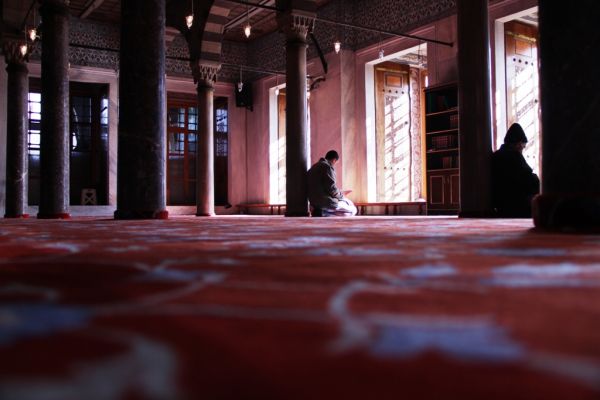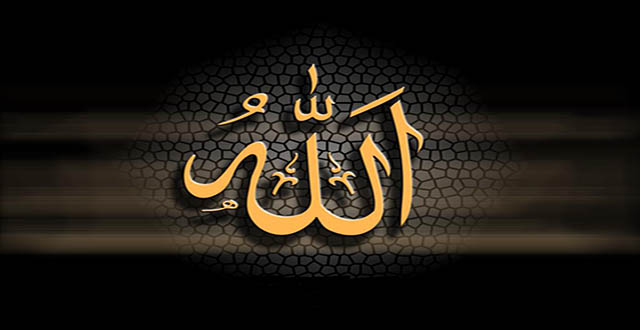A Yazidi slave girl has claimed the high-ranking ISIS commander who held her prisoner was a white American who directed the terror group’s attacks and received personal letters from its leader.
Nada, 19, told MailOnline that US citizen Abu Abdullah al-Amriki (the American), 23, boasted about how beautiful women from all over the world wanted to join him in Syria and that he always kept a vial of poison on him – in case he was captured in battle.
She was bought by the ISIS emir – or local leader – at a slave auction in Islamic State’s de-facto capital of Raqqa, Syria, in October.

The tall, pale man with black hair and short beard bought nine girls in total but sold seven of them on.
Nada was taken to one of his ‘many’ heavily-guarded houses in Manbij, Aleppo, where she lived with the other Yazidi girl and her son.
The teenager, who is now in America, told her harrowing story to the US government after escaping with her captor’s phone. Her fellow Yazidi hostage, known as ‘Bazi’, is also in the country – she will give evidence against Abu Abdullah to Congress and wants the FBI to press charges against him.
MailOnline cannot independently verify these claims and Nada said she has never seen his picture before on videos or images released by ISIS.
She said Abu Abdullah was a very important figure in Islamic State and a stream of armed balaclava-clad militants from all nationalities visited the house.
She said: ‘Many guests were coming and he was always explaining things to them. He was drawing maps of the fighting. He was telling everyone how to fight, about how to make an ambush.
‘He was always ordering people to move and how to make a plan. He always carried a pistol and an AK47.
‘There were also sniper rifles in the house, lying around. He also carried a policeman’s stick which he used to beat me and the boy [another prisoner] with. He also slapped the boy.
‘They didn’t let me enter the room when they were talking. They only let me enter the room when they were talking tea to them.’
Nada described the wiry commander, who spoke Arabic badly, as a ‘nervous’ man who doused himself in strong perfume and yelled at her constantly.
He was so frightened of being captured that he always kept a vial of poison in his pocket, so he could commit suicide if his enemies ever took him alive.

One group of four men – who were always masked – visited Abu Abdullah regularly to bring him letters from ISIS’s leader Abu Bakr al-Baghdadi, said the woman.
Nada said: ‘If Abu Abdullah was not at home, I’d have to sign for it. I was just receiving it and putting it in his room.
‘The mail contained letters and the envelope was from Abu Bakr al-Baghdadi. The masked man who brought the mail from al-Baghdadi talked in English.
Abu Abdullah, who converted to Islam around four years ago and has many different identities, told Nada that he regularly travels to the United States to see his family, but there is no way to verify his sensational boast.
She said: ‘He showed me pictures of his family – he had a girl and a boy. He said his family were not around, that they were far away.’
Nada was captured in the northern Iraqi city of Tal-Afar, around 32 miles from Sinjar, in around August 2014.
The terror group abducted more than 500 Yazidi women and young girls and slaughtered 5,000 as its fighters stormed through the region.
ISIS views Yazidis, whose religion includes elements of Christianity and Islam, as ‘devil-worshippers’.
The extremists take the females as their personal sex slaves and execute the men who do not convert to their twisted brand of Islam.
The teenager was taken to Manbij, a north-Syrian town which earned the nickname ‘little London’ because of the high numbers of British jihadists who live there.
Manchester twins Salma and Zahra Halane, 17, are thought to live in the town where English and German are commonly spoken.
Danish charity worker Ahmad Walid Rashidi, who was held captive in Manbij for over a month, met a blue-eyed British fighter in its police station.
He told the Sunday Times: ‘It’s like a little London or a little Berlin. Manbij is definitely the most foreign-influenced place in Syria.’
Rashidi, 23, said foreign fighters were paid around £20 a month and received free food and medicine, while jihadi brides got a £2 allowance.
During Nada’s 20-day captivity, the American jihadi also showed her pictures and footage of American girls who he claimed were coming to Syria to join ISIS.
She said: ‘There were beautiful girls or women from everywhere, from every country – he showed me them.
‘He said: “They are free and they want to come and join us, so why is it that you want to leave? Why do you want to run away? This is a good country.”
‘Abu Abdullah told me that I and the other girl will have a long life with him as servants – and our children will grow up to be jihadis like them.’
The ‘other girl’ was a Yazidi known only as Bazi, 20, who was held hostage alongside Nada after she was abducted during the ISIS assault on Sinjar in August 2014.
Bazi told CNN that Abu Abdullah would pray and wash himself before he raped her and how she pleaded with him not to touch Nada.
She said: ‘The first time he raped me, he tried to rape the other girl who was with me but I told him since I felt I’m already raped, I don’t want the other one [to be raped].
‘So I became responsible for the other one. I told him to treat her as a servant for him, because he was sheikh, an emir, so he would just have her as a servant. I convinced him the whole time until we were able to escape from his house.’
Bazi’s physical description of Abu Abdullah matched Nada’s and she also claims he told her about visiting his family in America but, again, the claims cannot be independently confirmed.
The American terrorist and his ‘team of bodyguards’ beat them after each of their five failed escape attempts. He once prevented Bazi from seeing her son for an entire week, Nada told MailOnline.
One day, when Abu Abdullah and his guards went to battle in northern Iraq, Nada stole his phone and ran to another house in Manbij.
She said: ‘When they were away fighting in Kobani, me and the other girl broke the door and left with the boy.’
They kept a low profile until the Assayish – police from the Kurdish Regional Government (KRG) – came to rescue her.
She gave Abu Abdullah’s phone to the KRG, who interviewed her and took her to a refugee camp in northern Iraq.
Here, she was interviewed by US government officials who visited the settlement and showed her pictures of another American jihadi who went by the nom-de-guerre, Abu Zeyd.
She said: I recognized it. Abu Zeyd was a beautiful man – he had long blond hair, and no facial hair. But I don’t know who he is. They had no pictures of Abu Abdullah.’
Traumatised, Nada struggled to speak for around 10 days after reaching the relative safety of the camp.
She eventually got in touch with a man inside ISIS territory, who smuggles Yazidis out for money, to see if he could help her brother who was still a prisoner.
Her contact told her that Abu Abdullah is still alive.
Nada is one of hundreds of women and young girls who have escaped from Islamic State’s clutches, only to tell of how they endured unimaginable cruelty and sexual abuse.
In May, a 17-year-old Yazidi girl described how she and her little sister were raped daily by a depraved jihadist before they were both sold at a ‘slave auction’ in Syria.
An even younger Yazidi girl known only as Bahar, 14, once told of how she was forced to undergo medical exams to ‘prove’ her virginity before she was sold to ISIS fighters in another twisted auction.
/149







